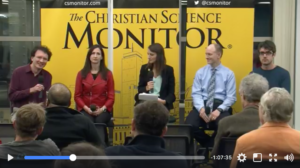Searching for life

The question of whether there is life elsewhere in the universe fascinates science fans and scientists alike.
The Christian Science Monitor recently called on Professor Geoff Collins and three other scientists involved in exploring the question of whether life could exist elsewhere to participate in a live panel and webcast at the NonProfit Center in downtown Boston.
Collins studies the icy moons of the outer solar system where he and other planetary scientists have identified features—liquid water, heat and geological processes—that suggest some form of life might possible in these environments.
The other panelists included Christopher Carr, a Massachusetts Institute of Technology (MIT) research scientist developing instruments for future space probes; pioneering MIT astrophysicist Sara Seager; and Harvard environmental scientist Robin Wordsworth.
“In many ways, we’re searching for our own reflection,” the Monitor’s editors explained. “But what about life as we don’t know it? Would we even recognize life out there—if it’s there to be found?”
The panel discussion focused on the difficulties of searching for signs of life, in our solar system and beyond, and some of the directions that scientists are taking to answer this age-old question.
“I’m very excited about Jupiter’s moon Europa because, out of all the icy moons we find in the outer solar system, it’s the one that appears to be a place where the entire surface has been active over relatively recent geological time,” Collins said.
Geologic activity increases the likelihood that the building blocks of life have been combined together in Europa’s sub-surface oceans, creating an environment capable of incubating some form of life. NASA is currently developing plans for a new probe, the Clipper mission, to return to Europa.
Professor Collins and his Wheaton colleague Associate Professor of Physics Jason Goodman, along with their students, are currently participating in a five-year, $50 million effort to study the origins, evolution, distribution and future of life in the universe.
